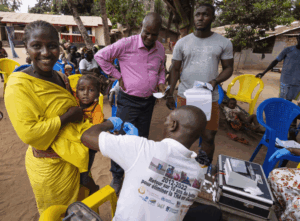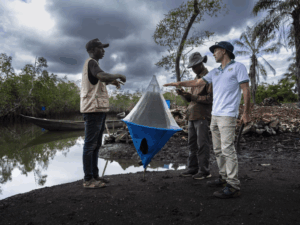Innovation to go the last mile in sleeping sickness elimination in Guinea… and all of Africa
A story by the Drugs for Neglected Diseases initiative (DNDi)
Photos by Brent Stirton/Getty Images for DNDi
(Read the Introduction to this series here, Step 1: Controlling the TseTse Fly here, Step 2: Building Trust here, Step 3: Going from Door to Door here.)

Guinea’s announcement that it eliminated sleeping sickness as a public health problem is an incredible step, but as anyone working on the disease anywhere in the world will tell you – this kind of victory does not always stand the test of time. The WHO validation is an acknowledgement of decades of incredible work and perseverance.
But patients like Macire show that the work is not yet over.
As is the case throughout Africa, sleeping sickness is a cyclical disease, often resurging as a result of political or societal upheaval. In Guinea, there were thousands of cases in the 1960s, but control programmes brought them down. Another rise in cases in the 1990s was tackled by Prof. Camara’s Sleeping Sickness Programme, but then disaster struck with the Ebola outbreak.
The validation of elimination by WHO this year is testament to the role science, research, and partnership have played in bringing cases back down after Ebola. But another dose of innovation will be needed to go the last mile in sustainable elimination and treatments developed by the Drugs for Neglected Diseases initiative (DNDi) will play an important role in going this critical – and difficult – last mile.

Taking a step back, the story of sleeping sickness treatment is well known in the tropical disease community. Toxic, ineffective, and often deadly treatments were the norm until recently, when DNDi developed and introduced safe and effective treatments – treatments that are saving lives in Guinea today.
The most revolutionary of these treatments is acoziborole, a single dose sleeping sickness medication seen by many experts as the critical tool needed to sustainably eliminate sleeping sickness, by allowing teams to quickly treat small, isolated outbreaks of the disease. Results from a trial that was conducted in Guinea and the DRC were published in 2022 and showed success rates of up to 95% for this one-dose cure for sleeping sickness. At the same time, a clinical trial is ongoing in Guinea and the DRC to assess acoziborole in children.
‘We are really looking forward to acoziborole. The trials have shown that patients recover very quickly from sleeping sickness – doctors were amazed to see this with a single dose of pills,’ said Dr Mariame Camara, DNDi Investigator, National Sleeping Sickness Programme. Dr Camara has worked extensively on DNDi’s clinical trials in Guinea, drawing from her long experience treating sleeping sickness patients in Guinea over the past years.

Pan-African clinical trials
DNDi has been working with partners in Guinea since 2016, with clinical trials starting in 2018.
The ‘Centre Trypano’ hospital in Dubreka served as the main centre for DNDi’s sleeping sickness clinical trials in the country, recruiting about 300 participants. To support the research, DNDi renovated hospital facilities, drawing on its rich experience running clinical studies in the DRC.
Dr Wilfried Mutombo, the Head of Clinical Operations for DNDi in the DRC, worked hand in hand with Dr Camara and the rest of the team in Guinea. This pan-African approach linking Dr Wilfried’s team in DRC and the Guinea team was an integral part of the DNDi story in Guinea.
‘All our sites in Guinea were rehabilitated by DNDi along the lines of what we’ve done in DRC – renovating the labs, patient rooms, and offices, and installing internet connection,’ said Dr Wilfried. There was a huge exchange between the site of Masi Manimba, DNDi’s most important sleeping sickness site in the DRC, and Dubreka.’

The DNDi clinical trials were the first in which most of the Guinean researchers had participated. ‘The trials played an important role in building treatment capacity in the country,’ Dr Camara said.
Making medical history
In many ways acoziborole is the last piece of the elimination puzzle, fitting in with effective vector control, community sensitization, and easy diagnosis done at the village level. Dr Camara looks forward to the day both diagnosis and treatment can be given on the spot: ‘A patient only needs to receive a positive rapid diagnostic test in a community screening, and we can give them a single-dose of treatment with acoziborole.’
DNDi is working with industry giant Sanofi to register acoziborole. The teams are hoping that the drug can be in the hands of health workers in Guinea, the DRC, and other sleeping sickness endemic countries by 2027, so African countries can work together to finally put the threat of sleeping sickness to bed.
‘Acoziborole is a revolution. It can be given very easily to large number of patients, especially those who are in advanced stages. This drug will help us go the next step in completely eliminating sleeping sickness from Guinea.’
— Dr Mariame Camara, DNDi Investigator

After her diagnosis back in Dubreka hospital, Macire returned to her room at the opposite end of the hospital. With rain still pouring down outside, she solemnly laid out a prayer rug and began offering prayers.
‘She is praying,’ said Dr Mamadou Baiolo Diallo, one of the sleeping sickness doctors at Dubreka hospital. ‘Not because she is scared, but she is happy. She will receive treatment – she trusts the treatment, and she knows that she will be cured. Her life will be saved.’

Related Articles

Bölët Mouna: Inside Guinea’s Quest to Eliminate Sleeping Sickness (Step 3)
Guinea has achieved a historic milestone by eliminating sleeping sickness as a public health problem, becoming the first country to conquer this deadly neglected tropical disease with the support of DNDi. In Step 3, read how going door to door helped the process.

Bölët Mouna: Inside Guinea’s Quest to Eliminate Sleeping Sickness (Step 2)
Guinea has achieved a historic milestone by eliminating sleeping sickness as a public health problem, becoming the first country to conquer this deadly neglected tropical disease with the support of DNDi. In Step 2, read how community trust was built.

Bölët Mouna: Inside Guinea’s Quest to Eliminate Sleeping Sickness (Step 1)
Guinea has achieved a historic milestone by eliminating sleeping sickness as a public health problem, becoming the first country to conquer this deadly neglected tropical disease with the support of DNDi. In Step 1, read how the tsetse fly was controlled.
